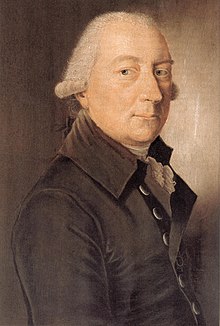Loading AI tools
Duke of Nassau From Wikipedia, the free encyclopedia
Friedrich August, Duke of Nassau, Prince of Nassau-Usingen (23 April 1738 in Usingen – 24 March 1816 in Wiesbaden) was the last Prince of Nassau-Usingen and, jointly with his cousin, Friedrich Wilhelm of Nassau-Weilburg, first Duke of Nassau. He died without surviving male issue and was succeeded by his cousin's son, Wilhelm.
| Frederick Augustus | |||||
|---|---|---|---|---|---|
 Frederick Augusts, Duke of Nassau | |||||
| Duke of Nassau | |||||
| Reign | 30 August 1806 – 24 March 1816 | ||||
| Predecessor | None. New Title | ||||
| Successor | William | ||||
| Prince of Nassau-Usingen | |||||
| Reign | 17 May 1803 – 24 March 1816 | ||||
| Predecessor | Charles William | ||||
| Successor | None. Incorporated into the Duchy of Nassau | ||||
| Born | 23 April 1738 Usingen, Principality of Nassau-Usingen | ||||
| Died | 24 March 1816 (aged 77) Schloss Biebrich, Wiesbaden, Duchy of Nassau | ||||
| Spouse | Princess Luise of Waldeck and Pyrmont | ||||
| Issue | Princess Christiane Luise Princess Karoline Friederike Princess Augusta Prince Friedrich Wilhelm Princess Lousie Maria Princess Friederike Victoria Prince Frederick Charles | ||||
| |||||
| House | House of Nassau-Usingen | ||||
| Father | Charles, Prince of Nassau-Usingen | ||||
| Mother | Princess Christiane Wilhelmine of Saxe-Eisenach | ||||
| Religion | Calvinism | ||||
Friedrich August, born in Usingen, was a younger son of Prince Charles of Nassau-Usingen and Princess Christine Wilhelmine of Saxe-Eisenach (daughter of John William III, Duke of Saxe-Eisenach). From 1744, he lived with his parents in Schloss Biebrich in Wiesbaden. He followed a military career in the army of the Holy Roman Empire and served in the Seven Years' War. In 1790, he became a Field Marshal.
On 17 May 1803, he succeeded as the Prince of Nassau-Usingen when his elder brother, Charles William, died without male heirs. On 6 July 1806, he joined the Confederation of the Rhine in order to prevent Napoleon from annexing the principality. Shortly thereafter, on 30 August 1806, he agreed with his cousin Friedrich Wilhelm of Nassau-Weilburg that their territories should be united into a single Duchy of Nassau with Frederick Augustus as the first duke and Frederick William as co-ruler. Since Friedrich August's sons had died young, it was also agreed that the combined duchy and sole rulership would pass to the heir of the Nassau-Weilburg line.
After Napoleon's defeat at the Battle of Leipzig, Friedrich August joined in the allies fighting against the French emperor. Nassau's troops fought under the command of Arthur Wellesley, 1st Duke of Wellington at the Battle of Waterloo. At the Congress of Vienna, the unification of the Duchy of Nassau was approved and the duchy joined the German Confederation.
Friedrich August was an enlightened and liberal ruler who established reforms such as the elimination of tax privileges for the nobility, the introduction of press freedom and the constitution for a modern state. His court at the Biebrich Castle was praised by visitors for its serenity and hospitality.[according to whom?]
On 9 June 1775, Friedrich August married Princess Luise of Waldeck and Pyrmont (born 29 January 1751 in Arolsen, died 17 November 1816 in Frankfurt am Main), daughter of Karl August, Prince of Waldeck and Pyrmont and Countess Palatine Christiane Henriette of Zweibrücken-Birkenfeld. The couple had seven children (5 daughters and 2 sons), but only their daughters survived infancy.
| Ancestors of Frederick Augustus, Duke of Nassau | |||||||||||||||||||||||||||||||||||||||||||||||||||||||||||||||||||||||||||||||||||||||||||||||||||||||||||||||||||||||||||||||||||||||||||||||||||||||||||||||||||||||||||||||||||||||||||||||||||||||||||||||||||||||||||||||||||||||||||||||||||||||||||||||||||||||||||||||||||||||||
|---|---|---|---|---|---|---|---|---|---|---|---|---|---|---|---|---|---|---|---|---|---|---|---|---|---|---|---|---|---|---|---|---|---|---|---|---|---|---|---|---|---|---|---|---|---|---|---|---|---|---|---|---|---|---|---|---|---|---|---|---|---|---|---|---|---|---|---|---|---|---|---|---|---|---|---|---|---|---|---|---|---|---|---|---|---|---|---|---|---|---|---|---|---|---|---|---|---|---|---|---|---|---|---|---|---|---|---|---|---|---|---|---|---|---|---|---|---|---|---|---|---|---|---|---|---|---|---|---|---|---|---|---|---|---|---|---|---|---|---|---|---|---|---|---|---|---|---|---|---|---|---|---|---|---|---|---|---|---|---|---|---|---|---|---|---|---|---|---|---|---|---|---|---|---|---|---|---|---|---|---|---|---|---|---|---|---|---|---|---|---|---|---|---|---|---|---|---|---|---|---|---|---|---|---|---|---|---|---|---|---|---|---|---|---|---|---|---|---|---|---|---|---|---|---|---|---|---|---|---|---|---|---|---|---|---|---|---|---|---|---|---|---|---|---|---|---|---|---|---|---|---|---|---|---|---|---|---|---|---|---|---|---|---|---|---|---|---|---|---|---|---|---|---|---|---|---|---|---|---|---|---|
| |||||||||||||||||||||||||||||||||||||||||||||||||||||||||||||||||||||||||||||||||||||||||||||||||||||||||||||||||||||||||||||||||||||||||||||||||||||||||||||||||||||||||||||||||||||||||||||||||||||||||||||||||||||||||||||||||||||||||||||||||||||||||||||||||||||||||||||||||||||||||
Seamless Wikipedia browsing. On steroids.
Every time you click a link to Wikipedia, Wiktionary or Wikiquote in your browser's search results, it will show the modern Wikiwand interface.
Wikiwand extension is a five stars, simple, with minimum permission required to keep your browsing private, safe and transparent.